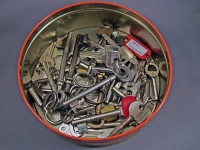Unclutterer thinks we carry too many keys with us. Sure enough, I have one on my keyring that I can’t even identify, although I think I had it made myself. It may belong to a bicycle I got rid of in 1998.
So, take a moment today to look at your keys even if you think you need them all. Just look at them one by one and ask yourself if you really need them.
What I am wondering about are the keys I don’t carry around with me. Here are the keys I was given when I moved into this flat:
Two are new ones belonging to a proper lock that the office insurance policy wanted me to install, but three are missing because a friend has them, and the one for the back yard is in my handbag. Two are for the cellar and one for the attic, two for the main building doors, one for my letterbox, two for my flat, but I don’t know about the rest.
(Indirectly via zonebattler’s homezone)


Hi Margaret, I live minutes from the second largest Amish population in the state of Ohio and about an hour from the largest population to the south. I have also visited the Pennsylvania Dutch area near Lancaster. Pot pies are not similar to Eintopf in that they are more creamy and the crust tends to be extremely flaky. They are also generally served in individual pie pans. When I think of Eintopf I generally think of beans and lentils being the central ingredient. Pot pies here in the U.S. contain no beans, etc. Amish food tends to be quite simple. I looked it up in my Amish cookbook (Amish Country Cookbook, Volume 1) and couldn’t find a listing for one, so I’ll be happy to ask one of the folks at the Amish restaurant about the origins of pot pies next month when I’m there.
Hi Jill. A nice weblog you have.
Did you look at the links? These pies have no crust on them, merely a collection of ‘noodles’ – Pim’s picture shows one (she is in Pennsylvania Dutch/Amish country at the moment). They are made in a pot on the stove.
Do you know where the term ‘bot boi’ comes from?
So, here’s what’s going on.
With etymologies, I should start by saying, reality is often obscured by a phenomenon called “folk etymologies,” which are made-up but widely believed stories that explain what a word means or how it came to mean what it does, or to create an etymological relationship where none exists. This is how you get strange stories about rooms and mush for “mushroom,” or why we say “sand-blind” for earlier “samblind.” There are hundreds of examples.
In reality, real etymologies are almost always simple and quite plain as long as you follow principles of historical linguistic reconstruction and the scientific practice of etymology.
One thing to note is that the dialects of Middle German from which Amish German or Pennsylvania Dutch is descended do not distinguish voiced from unvoiced consonants (b vs. p) but aspirated from unaspirated consonants. The result is that, to the English-speaker’s ear, you might hear a “b” when in reality it is simply a nonaspirate p. Dutch and Danish also exhibit some aspects of this aspirate/nonaspirate distinction, so it is common in Germanic languages.
In this case, “bot boi” is not from some mysterious German expression–no such term exists or has existed in German. All that’s going on is some confusion about p and b because of the aspiration issue I just mentioned.
In fact, “bot boi” actually comes from *English* pot pie. A pot pie is generally a hearty stew cooked in a pot with a crust on top; in the Amish and likely other traditions the top crust came to be formed by dumplings or noodles instead of by a pie-style crust. I don’t see this change as very big, honestly.
The attempts to get “bot boi” to derive etymologically from German are folk etymologies; Amish culture has borrowed many, many words from English, and “pot pie” is one of them.
I am German and very food interested and I have never heard of bot boi. And Eintopf is really different than what I find under pot pie. So I also think that your suspicion is correct, that it is the other way around…i.e. bot boi being a German (-speaking person) saying pot pie as heard by a non-German (-speaking) person.
Thanks to MT and Hande. Yes, I’m sure that’s what’s going on.
I’m going to add a quote from the OED to the entry. It gives three meanings for pot pie. The common US one is the doublecrust pie, and there are two rarer ones. I think the bot boi is based on one of these, that is, a ‘pie’ cooked in a pot.